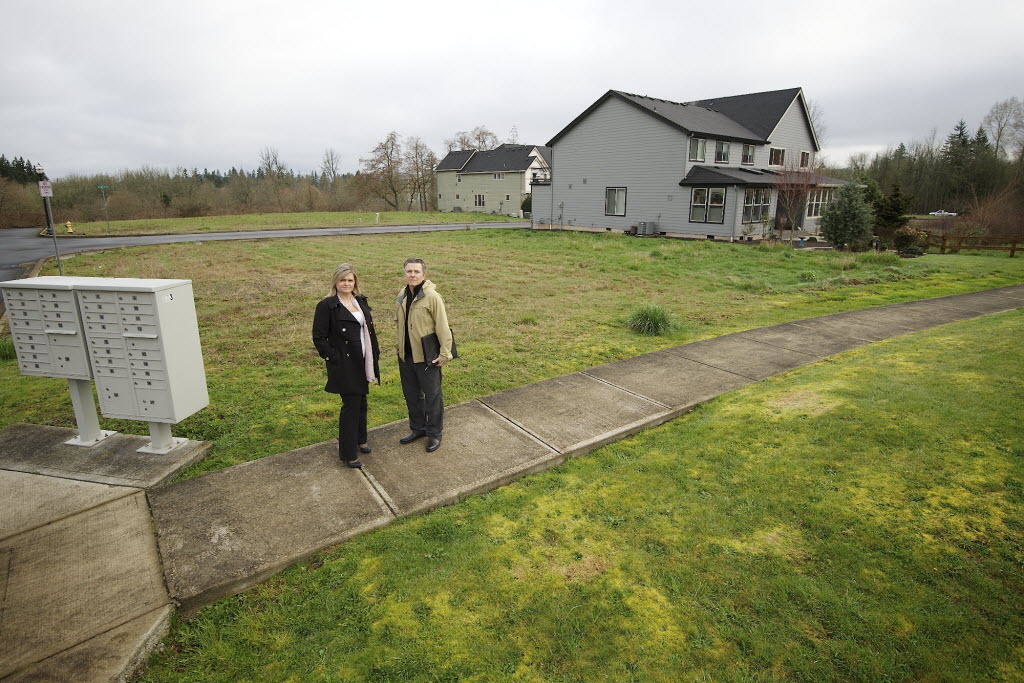CAMAS — Residents in the Stoneleaf Condominium Owners Association say they are challenging a developer’s plan to fragment their neighborhood.
The Stoneleaf neighborhood was planned in 2006 as a 54-unit development in west Camas, but only 14 condos have been constructed due to a series of problems, including the economic downturn and foreclosures. The existing condos are scattered around the neighborhood, and some are separated by undeveloped lots.
Patrick Ginn — the third in a succession of developers on the project — wants to secede the 40 undeveloped lots from the Stoneleaf homeowners association, develop the lots and start a separate homeowners association. He filed a lawsuit to that end in December in Clark County Superior Court.
“It kind of creates that Swiss cheese effect,” said Tracie Jellison, president of Stoneleaf Condominium Owners Association. “It really breaks us all apart.”
Residents worry Ginn’s plan would jeopardize their property values and deprive them of condominium dues from the 40 potential residences.
Condo owners typically own their own units but own the development’s land collectively. Dues typically pay for maintenance of building exteriors, lawns and common areas.
With a separate homeowners association, Ginn also would not be required to follow Stoneleaf’s covenants, conditions and restrictions, which include requirements for similar architecture and building materials.
“You buy into the neighborhood for certain reasons,” Jellison said. “When somebody comes in and thinks he can change all that without your consent, it’s very difficult. That’s why we’ve decided to fight this as home-owners.”
Ginn said he has attempted to address the homeowners’ objections to various plans to move the development forward but has been unsuccessful. That included a proposal to convert the development into townhouses. With townhouses, owners own the building and the land beneath it. Ginn didn’t purchase the development rights until March 2013, but he was involved in previous attempts by Columbia River Bank (now Columbia Bank) to develop the property into townhouses, said Stoneleaf resident Bernard Stea.
“They don’t like the idea of a separate homeowners association,” Ginn said. “It’s not an ideal situation, but after three years of trying to join the existing homeowners association we are moving forward with plans to build it out with a separate homeowners association.”
In his lawsuit, Ginn asserts that state law and the condominium’s property development rules — called declarant rights — authorize him to withdraw the undeveloped property from the homeowners association.
Because the property was foreclosed upon, he claims that state law allows him “to require from the association, upon request, an amendment excluding the real property from the condominium.”
He said he made written requests from the association, and its members failed to act on those requests.
The homeowners claim that James Howsley, Ginn’s attorney, then started sending letters threatening to sue the association and individual homeowners unless they approved the plan. Howsley declined to comment on the case to The Columbian, citing ongoing settlement negotiations.
The homeowners association’s position is that Ginn never bought the 40 undeveloped lots; he bought the rights to develop them in March 2013. Those development rights have expired.
Under the condominium’s development rules, Ginn was required to start construction on at least one condo before a Nov. 1 deadline.
“Right now, we have a community that consists of 14 units and a whole lot of undeveloped land,” said the homeowners association’s attorney, Jacob Zahniser of Portland.
“The declarant’s (developer’s) rights have expired. Where do they go? We believe they go back to the unit owners.”
Zahniser said that under the state Condominium Act, once the “right to develop additional units has expired the unit owners own an undividable interest in all the common elements in the community, including those portions of the community that were earmarked for additional units.”
The homeowners association last fall denied Ginn’s request for an extension of the deadline because they claimed that Ginn hadn’t been transparent about his plans and attempted to buy votes with favors and incentives. In a phone interview with The Columbian, Ginn denied those accusations.
“The whole time it’s been very transparent,” Ginn said. “We’ve worked very hard to work with them. We are not happy with the conflict with them. In the end, we have to be neighbors.”
Meanwhile, Stoneleaf residents are dealing with the ramifications of the stalled development.
Stea and his wife, Debbra Janes, said they and Janes’ elderly parents both bought a condo in the neighborhood in pursuit of low-maintenance home ownership. Stea said the condos were attractive because he and his family wouldn’t have to have to worry about tending a yard or exterior maintenance.
Due to the delay in the development, however, there haven’t been enough homeowners association dues to pay for that maintenance. Rather than increase dues, homeowners voted to take over the exterior maintenance of their respective homes. Stea and Janes, for example, just had to pay to have their condo’s exterior repainted, Stea said.
A hearing on a request for a summary judgement in the lawsuit is scheduled for 9 a.m. April 18 before Judge Scott Collier in Clark County Superior Court.



